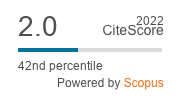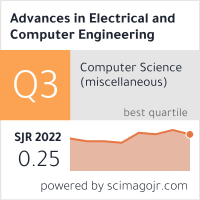| 1/2008 - 2 |
Temperature Optimization of a Naphtha Splitter UnitNEVADO, A. |
| View the paper record and citations in |
| Click to see author's profile in |
| Download PDF |
Author keywords
adaptive predictive expert, control, optimization, splitter unit
References keywords
control(26), sanchez(13), martin(11), predictive(8), adaptive(7), process(6), optimization(4)
Blue keywords are present in both the references section and the paper title.
About this article
Date of Publication: 2008-04-02
Volume 8, Issue 1, Year 2008, On page(s): 7 - 16
ISSN: 1582-7445, e-ISSN: 1844-7600
Digital Object Identifier: 10.4316/AECE.2008.01002
Web of Science Accession Number: 000259903500002
SCOPUS ID: 77955651689
Abstract
A fully reliable and efficient adaptive control methodology has been long awaited in industry due to the time-varying nature of industrial plants. This paper demonstrates that this kind of adaptive solution is now available and simple to apply by presenting the first application of a methodology called Adaptive Predictive Expert (ADEX) Control in a petrochemical production unit. A description of the plant and the ADEX solution is followed by a comparative analysis of the results obtained with those of the existing conventional PID control. The objectives of the application involving the naphtha splitter at the Puertollano Refinery of Repsol were to establish the viability of ADEX in this environment, increase the quality of the naphtha products by achieving closer compliance with desired specification and maximizing the economic yield. To achieve these objectives it was necessary to enhance the stability of the naphtha splitter by improving control of the principal variables and eliminating a degree of interaction between them which was causing a resonance problem in the column. The application of the ADEX system confirm its viability, demonstrated a marked increase in column stability, significant improvements in levels of control and the elimination of the resonance problems. |
| References | | | Cited By «-- Click to see who has cited this paper |
| [1] W. L. Nelson, "Petroleum Refinery Engineering", McGraw Hill Company, 1949.
[2] M. A. Ramos Carpio, "Petroleum Refinery, Natural Gas y Petrochemical (In Spanish)", Fundacion Fomento Innovacion Industrial, 1998. [3] C. A. Smith and A. B. Corripio, "Principles and Practice of Automatic Process Control", John Wiley and Sons, 2005. [4] J. Acedo Sanchez, "Instrumentation and Basic Process Control (In Spanish)", Diaz de Santos, 2006. [5] F. G. Shinskey, "Process Control Systems.Application,Design and Tuning", McGraw Hill Company, 1996. [6] F. G. Shinskey, "Distillation Control for Productivity and Energy Conservation", McGraw Hill Company, 1984. [7] J. Acedo Sanchez, "Instrumentation and Advanced Process Control (In Spanish)", Diaz de Santos, 2006. [8] J. M. Martin Sanchez, "Adaptive predictive control system", USA Patent No. 4,197,576, 1976. [9] J. M. Martin Sanchez, "A new solution to adaptive control", Proceedings of the IEEE, Vol. 64, 1209-1218, 1976. [CrossRef] [Web of Science Times Cited 46] [10] J. A. Richalet, J. L. Rault, J. L. Testud and J. Papon, "Model predictive heuristic control: applications to an industrial process". Automatica, Vol. 15, 413-428, 1978. [CrossRef] [Web of Science Times Cited 1171] [11] C. R. Cutler and B. L. Ramaker, "Dynamic matrix control; a computer control algorithm", Proc. Joint Automatic Control Conference, San Francisco, USA, 1980. [12] D. M. Prett and R. D. Gillette, "Optimization and constrained variable control of a catalytic cracking unit", Proc. Joint Automatic Control Conference, San Francisco, USA, 1980. [13] T. L. Blevins, G. K. McMillan, W. K. Wojsznis and M.W. Brown, "Advanced Control Unleashed", ISA, 2003. [14] A. S. Foss, "Critical of chemical process control theory", AIChE Journal, Vol. 19, 209-214, 1973. [CrossRef] [15] J. M. Martin Sanchez and S. L. Shah, "Multivariable adaptive predictive control of a binary distillation column", International Journal of Control, Vol. 39, 215-234, 1984. [16] S. Gonzalez, C. Corzo and J. M. Martin Sanchez, "SCAP optimization of cement production", World Cement, Vol. 25(7), 38-42, 1994. [17] J. Rodellar, A.H. Barbat and J. M. Martin Sanchez, "Predictive control of structures", Journal of Engineering Mechanics, ASCE, Vol. 113(6), 797- 812, 1987. [CrossRef] [Web of Science Times Cited 49] [18] G. Dumont, J.M. Martin Sanchez and Ch.C. Zervos, "Comparison of an auto-tuned PID regulator and an adaptive predictive control system on an industrial bleach plant", Automatica, Vol. 25(1), 33-40, 1989. [CrossRef] [Web of Science Times Cited 32] [19] L. Perez, J. Perez, J. Cerezo, J. Catediano and J. M. Martin Sanchez, "Adaptive predictive control in a thermal power station", Proc. of the 3rd IEEE Conference o Control Applications, Glasgow, UK, Vol. 1, 747-757, 1994. [20] J. M. Martin Sanchez and J. Rodellar, "Adaptive Predictive Control: From the Concepts to Plant Optimization", Prentice Hall, 1996. [21] J. M. Martin Sanchez, "Adaptive Predictive Expert Control System", U.S.A. Patent No. 6,662,058 B1, Dec. 9, 2003. [22] J. M. Martin Sanchez y J. Rodellar, "Control Adaptativo Predictivo Experto: Metodologia, Diseno y Aplicacion", UNED, 2005. [23] "ADEX Control & Optimization Platform: Manual for the User, Version 2.0", ADEX, S.L., 2006. [24] A. Cavanillas, F. Alonso, F. Riesco y J. M. Martin Sanchez, J. M., "Evaluacion de una Plataforma de Control adaptativo Predictivo Experto en la Refineria de Escombreras" IAS IEEE SAICA 2005, pp. 19-32, Madrid, Oct. 19, 2005. Web of Science® Citations for all references: 1,298 TCR SCOPUS® Citations for all references: 0 Web of Science® Average Citations per reference: 54 ACR SCOPUS® Average Citations per reference: 0 TCR = Total Citations for References / ACR = Average Citations per Reference We introduced in 2010 - for the first time in scientific publishing, the term "References Weight", as a quantitative indication of the quality ... Read more Citations for references updated on 2024-04-16 22:58 in 31 seconds. Note1: Web of Science® is a registered trademark of Clarivate Analytics. Note2: SCOPUS® is a registered trademark of Elsevier B.V. Disclaimer: All queries to the respective databases were made by using the DOI record of every reference (where available). Due to technical problems beyond our control, the information is not always accurate. Please use the CrossRef link to visit the respective publisher site. |
Faculty of Electrical Engineering and Computer Science
Stefan cel Mare University of Suceava, Romania
All rights reserved: Advances in Electrical and Computer Engineering is a registered trademark of the Stefan cel Mare University of Suceava. No part of this publication may be reproduced, stored in a retrieval system, photocopied, recorded or archived, without the written permission from the Editor. When authors submit their papers for publication, they agree that the copyright for their article be transferred to the Faculty of Electrical Engineering and Computer Science, Stefan cel Mare University of Suceava, Romania, if and only if the articles are accepted for publication. The copyright covers the exclusive rights to reproduce and distribute the article, including reprints and translations.
Permission for other use: The copyright owner's consent does not extend to copying for general distribution, for promotion, for creating new works, or for resale. Specific written permission must be obtained from the Editor for such copying. Direct linking to files hosted on this website is strictly prohibited.
Disclaimer: Whilst every effort is made by the publishers and editorial board to see that no inaccurate or misleading data, opinions or statements appear in this journal, they wish to make it clear that all information and opinions formulated in the articles, as well as linguistic accuracy, are the sole responsibility of the author.





